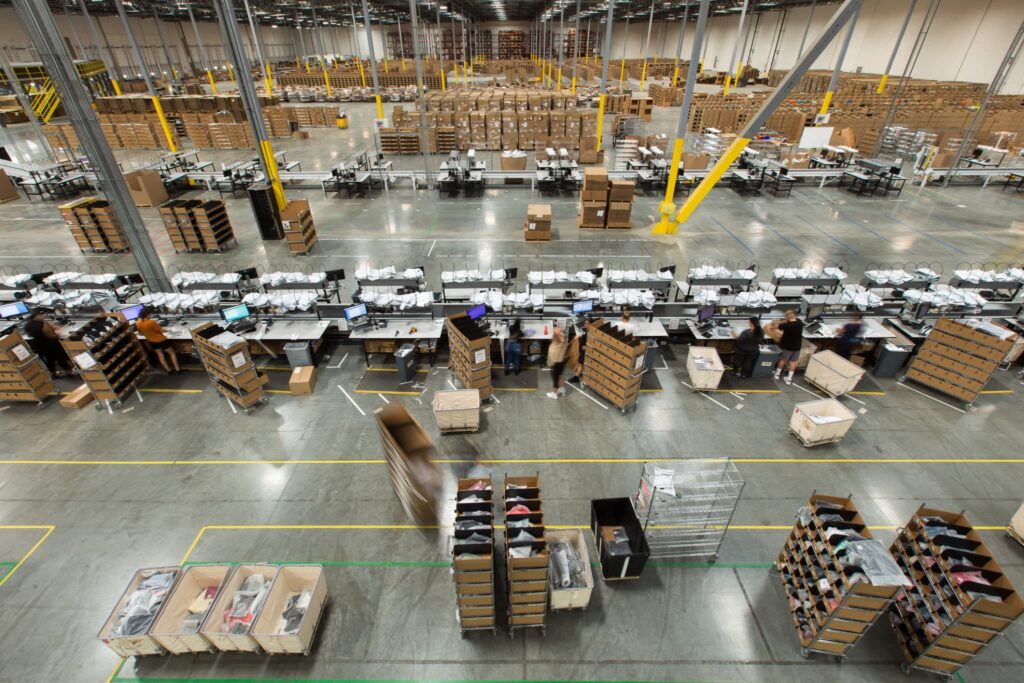How A Fulfillment Center Can Benefit Your eCommerce Business

Are you an eCommerce business owner looking to take your operations to the next level?
Whether you’re just starting out or are growing an online store, using a fulfillment center is one of the best ways to streamline and optimize your shipping process.
With a fulfillment center managing your back-end logistics like product assembly and shipping, you can free up time for other important tasks that are critical for the success of any eCommerce operation.
In this blog post, we’ll discuss how working with a fulfillment center can benefit your business, from faster order processing times to cost savings on supplies.
Keep reading to learn more about choosing and working with the right supplier so that you can realize all of these benefits and more.
What is a fulfillment center?
A fulfillment center is a third-party warehouse that specializes in providing eCommerce businesses with efficient and cost-effective storage, order processing, and shipping solutions.
Fulfillment centers can help you streamline your order process, meaning your customers can get their orders faster.
They manage the entire process from beginning to end, including receiving your inventory, storing it, assembling products (if needed), packing orders, and shipping them out.
Examples of fulfillment centers include Fulfillment by Amazon (FBA), ShipBob, and Cratejoy.
What does a fulfillment center do?
A fulfillment center does much more than just store and ship your products. They provide a variety of services, including:
- Receiving and storing inventory
- Inventory management (tracking stock levels, setting reorder points, etc.)
- Order processing (assembling orders for shipment)
- Packing orders
- Shipping orders
- Customer service and returns management
By working with a fulfillment center, you can save time, money, and resources so that you can focus on other aspects of your business.
With the right supplier, you can realize all the benefits that come along with having a professional eCommerce fulfillment center in your corner.
What are the advantages of working with a fulfillment center?
There are many benefits of working with a fulfillment center, including:
1: Faster order processing times
You’ll be able to reduce the time it takes for your customers to receive their orders by outsourcing some of the work to a fulfillment center, meaning you can increase customer satisfaction and loyalty.
2: Cost savings on supplies
Working with a fulfillment center often results in cost savings on supplies such as boxes, packing materials, and shipping labels. This can help you save money in the long run.
3: Access to advanced logistics technology
You’ll be able to take advantage of modern technologies, such as automated storage and retrieval systems, which can improve your order accuracy and increase efficiency overall.
4: Increased scalability
With a fulfillment center handling your back-end logistics, you can more easily scale up or down as needed. This means that when demand is high, you’ll be better equipped to handle the influx of orders without compromising on quality or customer service.
5: Greater flexibility
Working with a fulfillment center gives you more flexibility when it comes to managing your inventory. You’ll be able to adjust your order processing and shipping services quickly, depending on the needs of your business.
Choosing the right supplier is key
When deciding which fulfillment center to partner with, there are a few important factors you should consider:
- Reputation: Research their reputation with both customers and suppliers to make sure they have a good track record. A good way to do this is to Google “[vendor name] + reviews” or “[vendor name] + testimonials.”
- Services offered: Make sure the fulfillment center offers all of the services you need, from storage and inventory management to order processing and shipping solutions.
- Technology: Look for a fulfillment center that makes use of advanced technologies, such as automated storage and retrieval systems, which can help you process orders faster and more accurately
- Cost: Compare prices of different fulfillment centers to make sure you’re getting the best deal for your money.
How do fulfillment centers work?
Fulfillment centers typically operate on a simple cycle of receiving, storing, processing, and shipping orders. Here’s how it works:
1: Receiving
When you place an order with your supplier, they will ship the inventory to the fulfillment center. The fulfillment center will then receive and store your products in their secure warehouses.
2: Storing
Once your products are stored in the fulfillment center’s warehouses, they will be organized and tracked using advanced tracking systems.
This helps to ensure that your inventory is always up to date-and accurately tracked.
3: Processing
When a customer places an order with you, the fulfillment center will pull the necessary items from your inventory and package them according to your specifications.
4: Shipping
Once the order has been packaged, the fulfillment center will ship it directly to your customer using their preferred shipping method.
5: Reverse logistics (returns)
If a customer needs to return an item, the fulfillment center will handle the returns process as well.
If necessary, the fulfillment center can also handle any returns or exchanges on your behalf. This helps to streamline the process and ensure that customers are satisfied with their purchase.
At what point should eCommerce businesses utilize fulfillment centers?
Obviously, utilizing fulfillment centers costs money.
So the glaring question for bootstrapping eCommerce business owners is: why not just do everything in-house?
This is a tough call and depends on your individual goals as a business owner. However, here are some example criteria for when you should invest in a fulfillment center:
- When your current order volume exceeds what you can handle yourself.
- When you’re starting to experience customer service complaints due to slow processing or shipping times.
- When you’re looking to expand into new markets and need a reliable way to get orders to customers quickly and accurately.
- When you want to focus more on expanding and growing your business, instead of just managing operations.
Fulfillment centers can be a great asset for eCommerce businesses, providing them with the services they need to run their operations efficiently and effectively.
But they aren’t for everyone.
Transitioning too early to a fulfillment center can be a costly mistake, so make sure to weigh the pros and cons before deciding whether or not it’s right for your business.
What’s the difference between fulfillment centers and warehouses?
Fulfillment centers are often confused with warehouses, but there are actually some important differences between them.
A warehouse typically stores raw materials or products that your business has purchased before they’re sold to customers.
On the other hand, a fulfillment center is a third-party service provider that handles order fulfillment for you.
They focus on storing, packaging, and shipping your products to customers as quickly and accurately as possible.
Fulfillment centers also often provide additional services such as reverse logistics (returns) and customer service.
Check out our post on 3PL inventory systems to dig deeper into the world of third-party fulfillment.
What to look for in an eCommerce fulfillment center
Not all fulfillment centers are created equal, so it’s important to do your research before choosing one.
Here are some tips for finding the best eCommerce fulfillment center:
- Look for a provider with experience in your industry and product types.
- Make sure they offer reliable shipping services across multiple locations.
- Check their customer service reputation and track record.
- Make sure they have a good returns policy and process.
- Ask about their systems for inventory tracking and management.
- Understand the costs associated with utilizing a fulfillment center, including setup fees, storage fees, labor costs, and more.
- Inspect their warehouse and fulfillment center to ensure it’s clean, organized, and up to your standards.
Next Steps
Fulfillment centers can be a great asset for eCommerce businesses of all sizes.
They can help you reduce costs, streamline operations, improve customer service, and expand into new markets.
But, it’s important to do your research and find the right provider for you.
Be sure to look at their experience in handling your product type, customer service reputation, shipping capabilities, returns policy, systems for inventory tracking and management, and costs associated with utilizing them.
That way, you can ensure you make the best decision for your eCommerce business.
For next steps see how to start an online store without inventory, how to sell on Amazon without any inventory, and compare FBA vs. 3PL solutions.
FAQs about fulfillment centers
What is a fulfillment center?
A fulfillment center is a third-party service provider that handles order fulfillment for you. They store, package, and ship your products to customers as quickly and accurately as possible.
Fulfillment centers may also provide additional services such as reverse logistics (returns) and customer service.
How do fulfillment centers make money?
Fulfillment centers usually charge a fee for their services. This can be a one-time setup fee, monthly storage fees, labor costs, and/or shipping fees.
What are the different types of fulfillment centers?
There are three main types of fulfillment centers: warehouse-based, third-party logistics (3PL), and dropshipping.
Warehouse-based fulfillment centers store your products in their own warehouses and handle the entire fulfillment process for you.
3PLs provide a range of services such as order processing, inventory management, packing, shipping, and returns.
Dropshipping centers work with suppliers to fulfill orders directly from the manufacturer or distributor without storing any inventory in-house.
What are the disadvantages of fulfillment services?
The main disadvantage of using a fulfillment service is the cost associated with it.
They can be more expensive than doing the fulfillment process in-house, depending on the provider and services they offer.
Further, some providers may not have experience in handling your specific product type or may lack the capabilities to quickly ship orders to multiple locations.
What is the difference between a fulfillment center and a 3PL?
A fulfillment center is focused on order fulfillment services such as storage, packaging, and shipping, while a 3PL (third-party logistics provider) offers more comprehensive services such as warehousing, transportation, and supply chain management.
How much does it cost to use a fulfillment center?
The cost of using a fulfillment center depends on several factors such as the type of products you’re selling, the volume of orders you receive, and the services you need.
Generally speaking, setup fees, storage fees, and labor costs are associated with utilizing a fulfillment center.
Do I need to use a fulfillment center?
It depends on your business needs. If you’re an eCommerce business with high order volumes or if you’re looking to expand into new markets, a fulfillment center might be the right choice for you.
On the other hand, if you have low order volumes and are comfortable managing the storage, packaging, and shipping of your products yourself, then using a fulfillment center may not be necessary.
It’s important to consider your product type, customer service needs, order volumes, and costs associated with utilizing them when deciding whether or not to use a fulfillment center.
That way, you can ensure you make the best decision for your eCommerce business.
[html_blocks id=”20106″]
